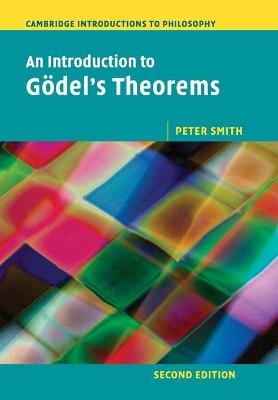
An Introduction to Gödel's Theorems
Cambridge University Press (Verlag)
978-1-107-60675-3 (ISBN)
- Titel ist leider vergriffen;
keine Neuauflage - Artikel merken
In 1931, the young Kurt Gödel published his First Incompleteness Theorem, which tells us that, for any sufficiently rich theory of arithmetic, there are some arithmetical truths the theory cannot prove. This remarkable result is among the most intriguing (and most misunderstood) in logic. Gödel also outlined an equally significant Second Incompleteness Theorem. How are these Theorems established, and why do they matter? Peter Smith answers these questions by presenting an unusual variety of proofs for the First Theorem, showing how to prove the Second Theorem, and exploring a family of related results (including some not easily available elsewhere). The formal explanations are interwoven with discussions of the wider significance of the two Theorems. This book - extensively rewritten for its second edition - will be accessible to philosophy students with a limited formal background. It is equally suitable for mathematics students taking a first course in mathematical logic.
Peter Smith was formerly Senior Lecturer in Philosophy at the University of Cambridge. His books include Explaining Chaos (1998) and An Introduction to Formal Logic (2003) and he is also a former editor of the journal Analysis.
Preface; 1. What Gödel's theorems say; 2. Functions and enumerations; 3. Effective computability; 4. Effectively axiomatized theories; 5. Capturing numerical properties; 6. The truths of arithmetic; 7. Sufficiently strong arithmetics; 8. Interlude: taking stock; 9. Induction; 10. Two formalized arithmetics; 11. What Q can prove; 12. I∆o, an arithmetic with induction; 13. First-order Peano arithmetic; 14. Primitive recursive functions; 15. LA can express every p.r. function; 16. Capturing functions; 17. Q is p.r. adequate; 18. Interlude: a very little about Principia; 19. The arithmetization of syntax; 20. Arithmetization in more detail; 21. PA is incomplete; 22. Gödel's First Theorem; 23. Interlude: about the First Theorem; 24. The Diagonalization Lemma; 25. Rosser's proof; 26. Broadening the scope; 27. Tarski's Theorem; 28. Speed-up; 29. Second-order arithmetics; 30. Interlude: incompleteness and Isaacson's thesis; 31. Gödel's Second Theorem for PA; 32. On the 'unprovability of consistency'; 33. Generalizing the Second Theorem; 34. Löb's Theorem and other matters; 35. Deriving the derivability conditions; 36. 'The best and most general version'; 37. Interlude: the Second Theorem, Hilbert, minds and machines; 38. μ-Recursive functions; 39. Q is recursively adequate; 40. Undecidability and incompleteness; 41. Turing machines; 42. Turing machines and recursiveness; 43. Halting and incompleteness; 44. The Church–Turing thesis; 45. Proving the thesis?; 46. Looking back.
| Reihe/Serie | Cambridge Introductions to Philosophy |
|---|---|
| Zusatzinfo | Worked examples or Exercises |
| Verlagsort | Cambridge |
| Sprache | englisch |
| Maße | 175 x 246 mm |
| Gewicht | 790 g |
| Themenwelt | Geisteswissenschaften ► Philosophie ► Logik |
| Mathematik / Informatik ► Mathematik ► Logik / Mengenlehre | |
| ISBN-10 | 1-107-60675-6 / 1107606756 |
| ISBN-13 | 978-1-107-60675-3 / 9781107606753 |
| Zustand | Neuware |
| Haben Sie eine Frage zum Produkt? |
aus dem Bereich


